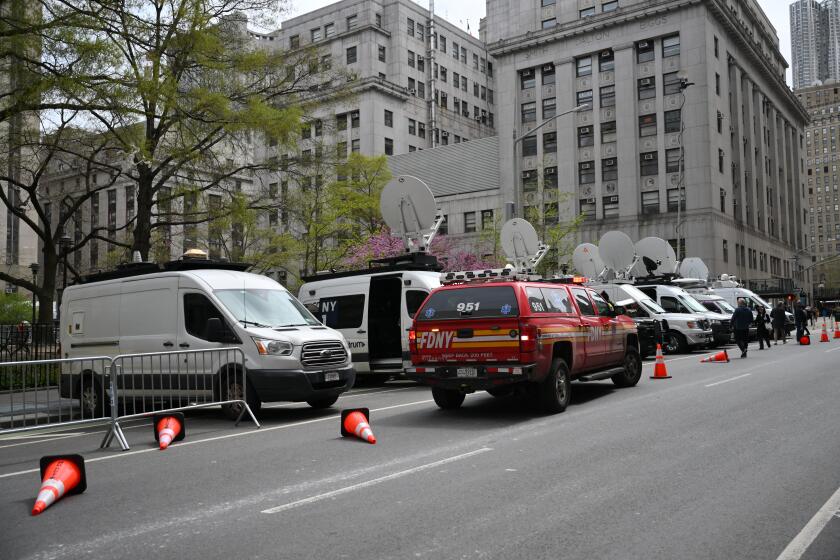Secret-prison inquiry names Poland, Romania
The CIA held suspected Al Qaeda militants in secret prisons in Poland and Romania, enlisting top officials in those countries to create and conceal the facilities, a European intergovernmental agency alleged Friday.
Current and former intelligence officials in Europe and the United States told the Council of Europe that the interrogation facilities were hubs of a global anti-terrorism campaign that used torture, clandestine flights and extrajudicial abductions known as extraordinary rendition, according to a report by the council, based in Strasbourg, France.
Although many of the allegations had already been made by human rights groups, former prisoners and the media, the report provided new details about how Washington’s Polish and Romanian allies allegedly set up heavily fortified, top-secret outposts where U.S. agents reportedly subjected “high-value” prisoners to abusive interrogations between 2003 and 2005.
“Poland and Romania agreed to provide the premises in which these facilities were established, the highest degrees of physical security and secrecy, and steadfast guarantees of noninterference,” said Dick Marty, a Swiss senator leading the inquiry. “We have spoken about the high-value detainee program with multiple well-placed sources in the governments and intelligence services of several countries, including the United States, Poland and Romania.”
In response, U.S. and European officials issued denials and questioned the senator’s objectivity. “When you see words like ‘apartheid’ and ‘torture’ in the document, that tells you it’s biased and distorted,” CIA spokesman Paul Gimigliano said.
Gordon Johndroe, a spokesman for the White House National Security Council, said he had not seen the report and that the White House would have no comment on it.
President Bush, whose only public comments Friday were during a brief visit to Poland before he flew to Rome, made no reference to the report.
The Council of Europe, a 47-state agency that promotes human rights and democracy, is a separate, less prominent entity than the European Union and does not have governmental investigative powers.
Marty acknowledged gaps in his conclusions, noting that he had not identified the location of the alleged CIA site in Romania. Although he cited CIA sources in alleging that Khalid Shaikh Mohammed, the self-proclaimed mastermind of the Sept. 11 attacks, was interrogated at the Polish site, he made the assertion based on analysis of data about apparent CIA flights to Poland shortly after Mohammed’s capture.
Marty accused airport directors, spy chiefs and the presidents of Poland and Romania of “a whole series of illegal acts” related to the secret prisons.
In September, Bush acknowledged the existence of foreign interrogation sites without naming the locations.
He said the methods used in the interrogations were “safe, lawful and necessary” and had obtained “vital information necessary to do our jobs, and that’s to protect the American people and our allies.”
U.S. allies in Europe have been critical of renditions and other hard-nosed, extrajudicial tactics such as the detention and military trials of terrorism suspects at the U.S. prison at Guantanamo Bay, Cuba. But some European anti-terrorism officials say privately that sometimes brutal measures by U.S. agencies have helped prevent Al Qaeda strikes on the scale of the Sept. 11 attacks.
The CIA chose Poland and Romania for the unprecedented, politically explosive operations because they are staunch and eager U.S. allies, the report asserted.
Washington formed “special partnerships with countries that were economically vulnerable, emerging from difficult transitional periods in their history, and dependent on American support for their strategic development,” the report said. It cited a “long-serving CIA officer” saying: “We have an extraordinary relationship with Poland.”
In 2002, the CIA won the approval of Poland’s then-president, Aleksander Kwasniewski, the report alleged. American intelligence officers worked exclusively with Polish military intelligence to avoid civilian oversight, the report said. It alleged that CIA planes using “dummy flight plans” began arriving in early 2003 at the Szczytno-Szymany airport in northeastern Poland, carrying prisoners considered to be leading Al Qaeda figures.
Though Polish security forces provided an outer ring of protection, only Americans handled the prisoners, the report said. U.S. agents in vans took them to the secret facility at Stare Kiejkuty, an intelligence training base, the report said.
“Polish officials were not involved in the interrogations or transfers of [detainees], nor did they have contact,” Marty said.
Following a similar pattern, after gaining clearance from Romania’s then-president, Ion Iliescu, and assistance from his military intelligence service, the CIA opened a second interrogation site in Romania as the clandestine detention program expanded in late 2003 and 2004, the report alleged.
“Several of our Romanian sources commented that they felt proud to have been able to assist the United States in detaining ‘high value’ terrorists -- not only as a gesture of pro-American sentiment, but also because they thought it was in the best interest of Romania,” the report said.
Both secret prisons were allegedly dismantled by late 2005 and the prisoners transferred elsewhere, according to Marty.
Times staff writers James Gerstenzang in Rome and Greg Miller in Washington contributed to this report.
More to Read
Start your day right
Sign up for Essential California for news, features and recommendations from the L.A. Times and beyond in your inbox six days a week.
You may occasionally receive promotional content from the Los Angeles Times.






